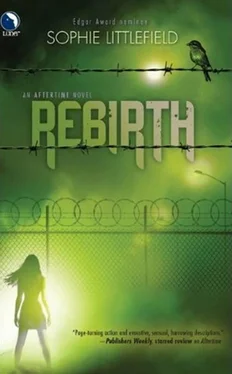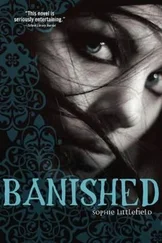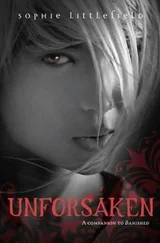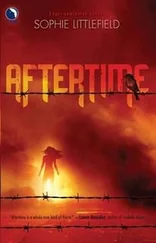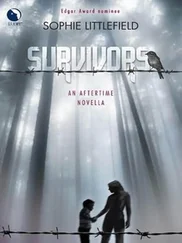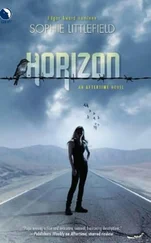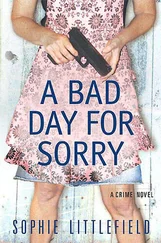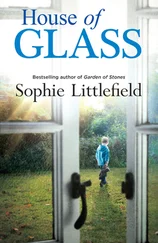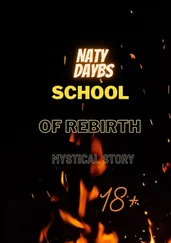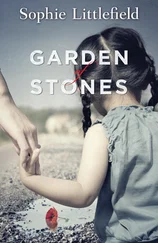Dor picked up a stone from the street and threw it, his aim sure and deadly. The stone struck one of the birds’ heads and it fell over, its wings and claws drawn up in death. The others squawked furiously and skittered backward, flapping and jumping, one or two flying up to the second floor windows.
In the inadequate light of the moon and stars, Dor could not see much of the scene before him. He shone his flashlight beam on the bodies and wished he hadn’t.
Dor had seen even more than most. He’d trained himself never to look away, to remain dispassionate in the face of horror and ruin. He’d been a baggerman, loading bodies on trucks when there was still gas to be had; he’d joined the crew that stacked and burned the dead. By then he’d moved out of the Silva house and into a friend’s vacant cabin up in Sykes, and there were no more client accounts to play with and no reliable power for his laptop, and he needed to find a way to stay busy. When they quit collecting the dead, he was among the first raiding parties, the ones who brought supplies to hospitals and nursing homes, until the hospitals and nursing homes were nothing but mausoleums themselves.
He’d waited too long. He should have gone back to Silva while he still could, but in their last phone conversation, Jessica had told him to stay away. “Sammi’s already lost you once,” Jessica said. “She can’t lose you again. I’m telling her you’ll stay there, where you’re safe. Don’t make a liar out of me, Doran. Please.”
He’d listened to Jessica and stayed. He threw himself into helping anyone in Sykes who asked, and when the weak and vulnerable had finally all died and there was nowhere else to volunteer, he set out for San Pedro, where he’d heard about a cult taking up residence in the Miners stadium. By then he’d already decided to become a trader. He talked a guy named Nolan from an A-frame down the road into coming with him, and they loaded down a shopping cart with loot from a dozen empty cabins, liquor and candy bars and sanitary pads and antifreeze and boxes of Band-Aids. They pushed the cart the few miles to Sykes in the middle of the night, a flashlight wired to the front of the cart, though they never switched it on, preferring to take their chances in the dark. Nolan had served in the Gulf, and he knew a few tricks for sheltering, which came in handy when they got to San Pedro and spent their first few nights in a little stucco house before they found the empty lot that would become the Box. Dor still thought of Nolan every time he passed that little house.
The house where he’d come back from the creek carrying a bucket of water one morning shortly after they’d arrived and found nothing left of Nolan but the piss stain on the side of the wall where the Beaters had found him.
That was a devastating sight, worse in some ways than the many dead he later saw during scavenging missions, desiccated skeletons lying in beds and slumped at tables and many, many who still hung where they’d rigged their own death ropes. He’d found the bodies of children in their mothers’ arms with holes in their skulls, and he’d smelled every taint of rot, of bodies trapped in cars and flooded basements and burned buildings. But he’d gotten through it.
He’d seen what the Beaters did, and euthanized a dozen victims who’d been unlucky enough to live through an attack. He steeled himself, and he shot them with a steady hand and a merciful heart and still was able to eat and sleep and make love afterward.
But now he looked upon two travelers who’d made it within a few blocks of safety only to be ravaged not once but twice, the remains abandoned by the Beaters only to be fought over by a species God or Nature had been careless or indifferent enough to allow to return, and Dor wondered if the balance had finally tipped to the other side, if all their work and vigilance and will to live would mean nothing, in the end, if each day or week would bring a new horror from the skies and the water and the land, and he would die as all the others had, without his daughter, without anything, and Dor turned and vomited on the street and the birds returned to their meal of carrion.
CASS DRESSED RUTHIE IN RED OVERALLS MEANT for a boy, with a truck appliquéd on the front. Underneath, two shirts. Over them, a parka with a soft band of fake fur edging the hood. Mittens on a cord looped through the jacket’s sleeves, and her too-tight boots were pulled on over long socks. Ruthie was too hot, but the pack was full to bursting with clothes and supplies and there was no room to stuff anything more inside.
Dor came for them in the first light of morning, before Cass expected him and she was glad, because she left the tent without having time to look around one last time. The pack on her shoulders was heavy but she was strong, her work in the garden turning her shoulders and arms sinewy and sunbrown, and though it was a poor substitute for the long runs through the foothills she’d once loved, she ran around the perimeter of the Box in the early morning when almost no one else was awake.
She was as fit as she had ever been-sober for nearly a year, her body free of any trace of the alcohol with which she had punished herself for so long. The kaysev diet seemed to do her good. The natural immunity that was the disease’s legacy kept her eyes and sinuses clear and her digestion regular. Her hair continued to grow at an astounding rate, and her nails were strong and hard and had to be trimmed constantly. Ruthie, too, was thriving, despite her silence-she’d grown an inch according to the pencil line Cass had drawn at the start of October on the bookshelf, and her molars had come in. Despite the occasionally restless night, Ruthie ate well and played energetically and these days she smiled more than she frowned.
When the curtains over the door lifted and Dor stood in the doorway silhouetted against the pale light of dawn, Cass stood, ready to go. Ruthie stared up at Dor with her usual frank appraisal. Despite the cold, Dor was dressed only in a flannel shirt over a T-shirt, and he held his parka over his arm. He had not cut his hair since Cass had first seen him, and it had grown in streaked with gray among the black and now it grazed his shoulders, the ends ragged and wet from his shower. The half dozen silver loops piercing the cartilage of his ears glinted in the light of her Coleman lantern, the use of which-with its hoarded batteries-was a special-day indulgence.
“Show me your blade,” Dor commanded in a voice rusty from sleep, regarding her with an expression that suggested he was still making his mind up about the wisdom of bringing her along.
Cass’s hand went automatically to her belt, which concealed a Bowen narrow double-edged blade. It too had been a gift from Smoke, traded for in a good-natured bidding war with a few of the guards. She held it out by the silver handle, its smooth curve familiar in her hand.
Dor nodded. “That will do.”
Cass replaced it. “What if it hadn’t?” she asked. “What if you didn’t like it?”
Dor bent on one knee, and she couldn’t read his expression. He held out a hand to Ruthie, and to Cass’s surprise, her daughter slipped her hand into his and followed him from the tent.
“I would have given you mine.”
Joaquin, the early-shift guard, mumbled a sleepy greeting and opened the gate for Dor, looking at Cass and Ruthie curiously but asking no questions. They’d encountered no one else on the walk from Cass’s tent, though she knew that outside the Box two more guards patrolled, on the lookout for Beaters roused by the dawn’s light. Somewhere in the cheap cots that lined the front wall, someone moaned in their sleep, visited by some terror or regret as the buzz from the night before wore off. Elsewhere someone coughed. These were sounds one grew used to, living in quarters as close as these.
Читать дальше
Конец ознакомительного отрывка
Купить книгу
